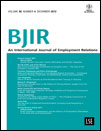The Flip Side of Organized Decentralization
Article by Anna Ilsoe
 Decentralization of collective bargaining has been a common trend in a number of Western economies over the last two or three decades. The Danish collective bargaining system is often considered a good example of so-called organized decentralization, as Danish union densities and coverage of collective agreements remain comparatively high.
Decentralization of collective bargaining has been a common trend in a number of Western economies over the last two or three decades. The Danish collective bargaining system is often considered a good example of so-called organized decentralization, as Danish union densities and coverage of collective agreements remain comparatively high.
This article sheds light on the consequences of organized decentralization at company level in Denmark by analysing data on local negotiations:
- What happens in practice, when negotiations are decentralized?
- Does it matter that the setting is organized?
Data are drawn from a large survey on company-level bargaining conducted among managers and shop stewards at 226 randomly selected manufacturing companies in the Danish industrial sector in 2008.
Reproduction of sector-level bargaining relations at company level
The analysis shows that it does matter that decentralization is organized in Denmark. In general, managers and shop stewards tend to reproduce sector-level bargaining relations at company level. Shop stewards are highly prevalent and the relationship between the local bargaining parties is characterized by trust in most companies. This means that the bargaining power and the bargaining culture at company level resemble the situation at sector level.
Also, these local bargaining relations seem to facilitate a high bargaining activity, as almost all companies, including SMEs, have concluded one or more agreements on pay and working hours.
Local negotiations challenge shop stewards
However, part of the survey also questions whether the reproduction of bargaining relations at company level will continue in the future. Shop stewards often find it difficult to gain employee support during negotiations, which jeopardizes their bargaining relations with management. Two different challenges can be identified on the side of the shop stewards with regards to employee support:
- High local bargaining activity often leads to more differentiated pay and working conditions among employees. Shop stewards have to create consensus among at least a majority of employees during negotiations in spite of these increasing differences.
- Minorities of employees can be squeezed in the process of concluding or implementing agreements if their demographics deviate from the majority. This can increase the number of workplace conflicts among employees, which needs to be mediated and solved by the shop steward.
Both challenges underline the importance of handling diversity among employees when negotiating and implementing company-level agreements. The capability of managers and especially shop stewards to do this seems to be an important precondition for a continuous reproduction of trust-based bargaining relations at Danish companies.
Article in British Journal of Industrial Relations, December 2012, Vol. 50, Issue 4.
